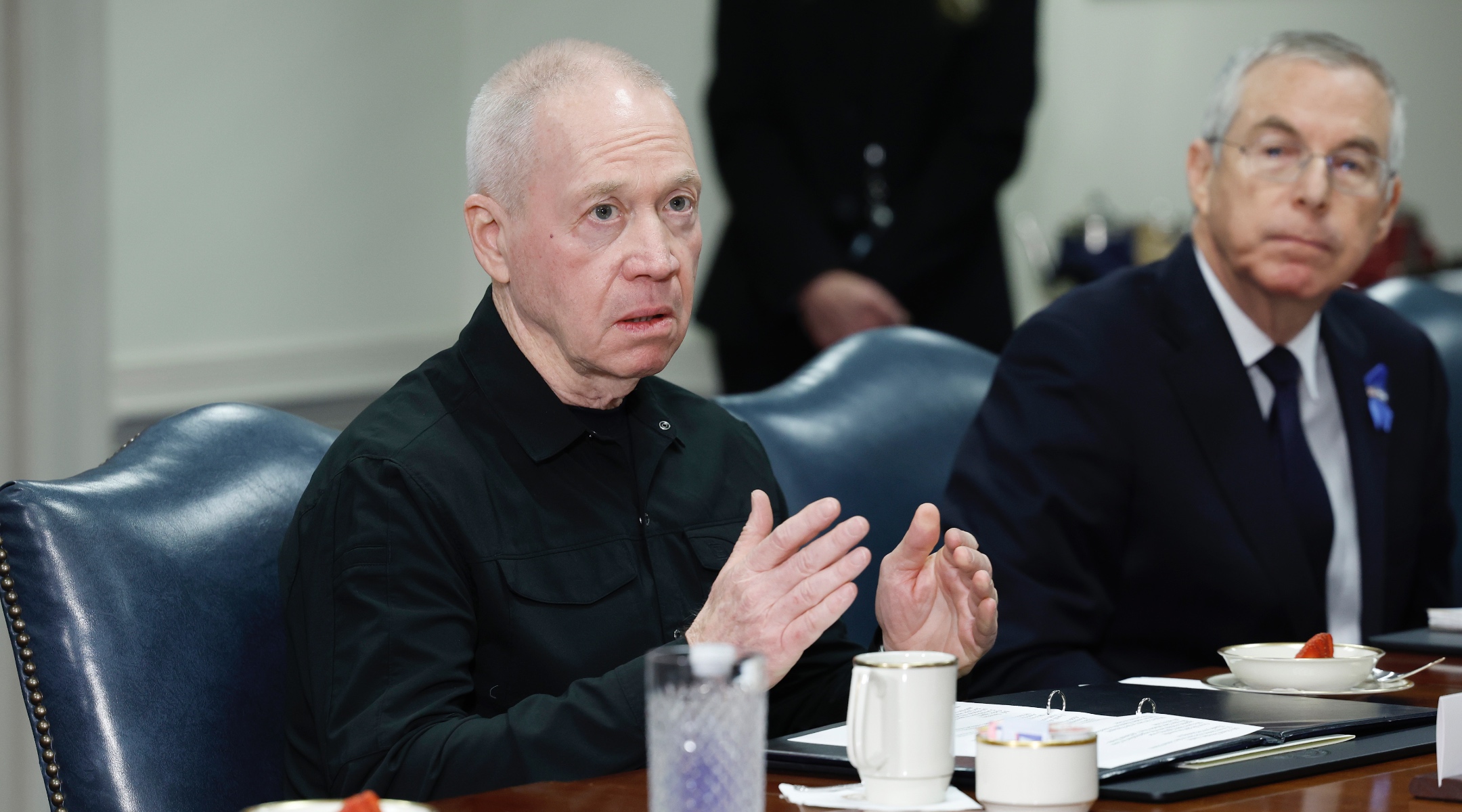WASHINGTON (JTA) — On Tuesday, shortly after Israeli Prime Minister Benjamin Netayahu accused the United States of failing to defend Israel on the world stage, his defense minister was in Washington emphasizing the importance of the U.S.-Israeli alliance.
“The visit to the United States comes at a crucial time for Israel,” Yoav Gallant said in a briefing to reporters on Tuesday afternoon. “I emphasized the value and importance of U.S.-Israel ties to the security of the State of Israel.”
Gallant’s visit comes at one of the most delicate times for American-Israeli relations in recent memory. The Biden administration has been increasingly critical of Israel’s military campaign against Hamas in Gaza. On Monday, the United States allowed the United Nations Security Council to pass a resolution calling for a ceasefire — a first in nearly six months of fighting.
In response, Netanyahu canceled a delegation of his senior advisers that was due to meet with American officials in Washington to discuss a potential Israeli invasion of Rafah, a city in southern Gaza. And the following day, after Hamas rejected a proposal for a ceasefire and hostage release, Israel pulled out of indirect negotiations with the terror group.
Meanwhile, a Gallup poll shows Americans disapprove of Israel’s military campaign by a wide margin: 55% disapprove of Israel’s conduct in Gaza while 36% approve — a shift from November, when the public was essentially split, with 50% approving and 45% disapproving.
Netanyahu’s decision to cancel the delegation left Gallant as the sole representative of Israel in the U.S. capital. The Jewish Telegraphic Agency has learned that Gallant, who belongs to Netanyahu’s Likud Party but has split in the past with the prime minister, was blindsided by Netanyahu’s decision and learned about it only upon landing in the United States on Monday.
Gallant, JTA learned, made clear to Defense Secretary Lloyd Austin and others he met, including Secretary of State Antony Blinken and National Security Adviser Jake Sullivan, that he believed conversation was still the best path forward for the two allies.
But when it comes to key points of contention between Biden and Netanyahu, Gallant agrees with Netanyahu.
Israel, he says, cannot abide a permanent ceasefire and must go into Rafah, the city on the Gaza-Egypt border, to rout what remains of Hamas, which launched the war on Oct. 7 when its terrorists massacred more than 1,200 people in Israel. More than 32,000 Palestinians have been killed in the war, according to the Hamas-run Gaza health ministry, and the Biden administration fears that an Israeli offensive in Rafah will endanger the more than one million people who have taken refuge there, often at Israel’s instruction.
Israel says it will evacuate the civilian population, but the White House is skeptical that that is possible.
“We have destroyed between 18 and 19 Hamas regional battalions and we have another five of them in Rafah,” Gallant told reporters. “This is the last significant holdout that hasn’t lost battalion commanders.”
But overall, Gallant’s tone was markedly different from Netanyahu’s, who on Wednesday met in Jerusalem with a Republican lawmaker, Sen. Rick Scott of Florida, and doubled down on his decision to cancel the meeting Biden requested.
“I thought the U.S. decision in the Security Council was a very, very bad move,” Netanyahu said, sending reporters photos of his warm handshake with Scott, who is one of the more fierce critics of Biden in the Senate.
“The worst part about it was that it encouraged Hamas to take a hard line and to believe that international pressure will prevent Israel from freeing the hostages and destroying Hamas,” Netanyahu said. The White House disputes that timeline, saying Hamas had rejected the truce proposal before the U.N. vote.
But Gallant, who was in Washington to discuss the United States delivering more weapons to Israel, instead emphasized the support that the Biden administration has shown Israel, in defense and diplomatic assistance, since the war’s launch.
“While I met with Secretary Austin, Hamas leader [Ismail] Hanniyeh was meeting with Iranian leadership — so it’s very easy to understand the sides,” he said. “I am here to emphasize the importance of those relations. We share 100 percent of the values and 99 percent of the interests with the United States.”
Blinken, Sullivan and Austin understood, Gallant said. He told reporters, “Our enemies need to know that this war will end with the destruction of the Hamas organization.” Describing his meetings with those officials, he added, “I think there is an understanding we have to dismantle Hamas.”
It’s not the first time Gallant and Netanyahu have disagreed on tone and politics, while sharing desired outcomes. A year ago, Netanyahu briefly fired and then rehired Gallant after the defense minister pleaded with him to pause the right-wing coalition government’s controversial plans to overhaul the judiciary.
In the year or so since then, Gallant has remained in his role, and is part of the three-person body — including Netanyahu and Benny Gantz, a centrist former defense minister — that has authority over Israel’s prosecution of the war.
JTA has documented Jewish history in real-time for over a century. Keep our journalism strong by joining us in supporting independent, award-winning reporting.






